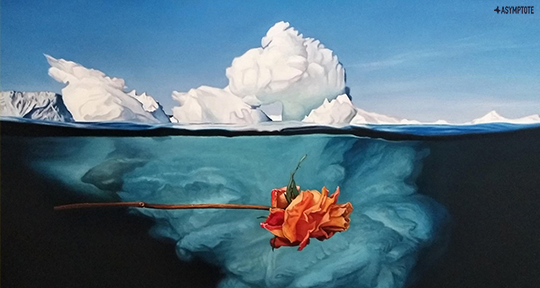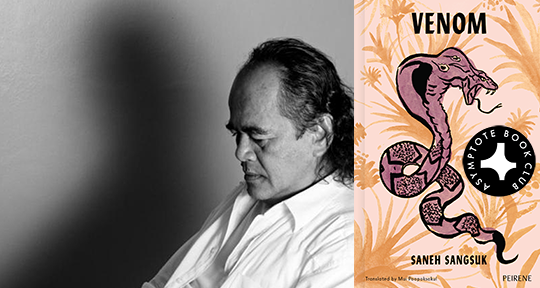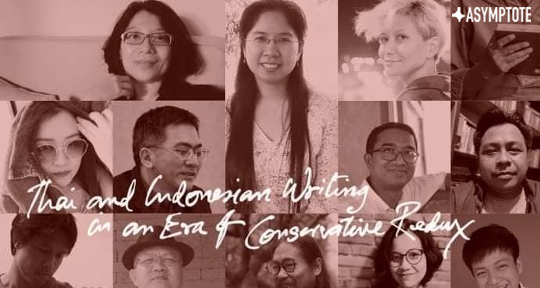This week our writers bring you the latest news from Poland and Thailand! In Poland, Julia Sherwood takes us through the Conrad Festival, the 2021 winner of the prestigious NIKE Prize, and the launch of the first ecopoetics course in the country. In Thailand, Peera Songkünnatham explains how an innovative series of illustrated children’s books have risked censorship for their depiction of government protests. Read on to find out more!
Julia Sherwood, Editor-at-Large, reporting from Poland
Tomorrow, 24 October, is the closing day of the 13th edition of the Conrad Festival that started in Kraków on 18 October headlined “The Nature of the Future”, which has sought to “imagine the shape of our near and distant future, all while thinking about the changes that we are going to witness in the natural environment”, as well as highlighting themes of feminism. International literary heavyweights—Han Kang, Rebecca Solnit, Marieke Lucas Rijneveld, Valeria Luiselli, Helena Janeczek, Elias Khoury, Lisa Appignanesi, Behrouz Boochani, Brandon Hobson, George Saunders and Petra Hůlová—as well as acclaimed Polish writers such as Julia Fiedorczuk, Mikołaj Grynberg and Dorota Masłowska have been taking part in discussions and presentations, held mostly online (the recordings can be watched on the festival’s YouTube channel.)
2021 NIKE Prize, Poland’s most prestigious literary award went to Kajś, Opowieść o Górnym Śląsku (Somewhere, A Tale of Upper Silesia), in which its author, Zbigniew Rokita, searches for his Silesian roots and grapples with his own ambivalent feelings about his native region. The decision to shortlist only one work of fiction while all the other books, including the winning title, represented nonfiction, caused some controversy. However, this is hardly surprising given the strong position of literary reportage in contemporary Polish literature. The genre even has its own award, the Kapuściński Prize (this year it went to Jessica Bruder’s Nomadland , translated into Polish by Martyna Tomczak) and its own teaching institution, the Warsaw Institute of Reportage whose founders and teachers include the most celebrated reportage authors Mariusz Szczygieł, Paweł Goźliński, and Wojciech Tochman.
Last year Filip Springer, one of the Institute’s teachers launched a new course, The School of Ecopoetics, the first of its kind in Poland. Feeling the need to explore what individuals and writers can do to prevent an ecological disaster, Springer, a writer and photographer (and past Asymptote contributor), approached the poet, translator, and literary critic Julia Fiedorczuk who is a leading exponent of ecopoetics in Poland (and also a past Asymptote contributor) to design the programme. Although the course was aimed at writers, poets, journalists, and critics, the organizers stressed that the School of Ecopoetics “is not a school of writing”. Instead, “its goal is to help the students develop ecocritical reflection, to change their way of thinking by drawing attention to the relations between human beings and non-human nature.” Judging by the enthusiastic responses shared by some of the first twenty graduates on the School’s Facebook page, the mix of traditional lectures and fieldwork (hiking through forests, sleeping in tents and discussions around the campfire) held from June 2020 to October 2021, was a resounding success. Recruitment for next year’s course starts in November. READ MORE…








A Pointed Atemporality: Mui Poopoksakul on Translating Saneh Sangsuk’s Venom
He's very aware of the rhythm and musicality of this text . . . he said it should take something like an hour and thirty-seven minutes to read.
In our May Book Club selection, a young boy struggles with a snake in the fictional village of Praeknamdang, in a tense battle between beauty and cruelty. In poetic language that is nostalgic for the world it describes without romanticizing it, Saneh Sangsuk creates a complex and captivating world. In this fable-like story there are no simple morals, in keeping with Sangsuk’s resistance to efforts to depict a sanitized view of Thailand and to the idea that the purpose of literature is to create a path to social change. In this interview with translator Mui Poopoksakul, we discuss the role of nature in the text, translating meticulous prose, and the politics of literary criticism.
The Asymptote Book Club aspires to bring the best in translated fiction every month to readers around the world. You can sign up to receive next month’s selection on our website for as little as USD20 per book; once you’re a member, join our Facebook group for exclusive book club discussions and receive invitations to our members-only Zoom interviews with the author or the translator of each title.
Barbara Halla (BH): How did you get into translation, especially given your law background?
Mui Poopoksakul (MP): I actually studied comparative literature as an undergrad, and then in my early twenties, like a lot of people who study the humanities, I felt a little bit like, “Oh, I need to get a ‘real job.’” I went to law school, and I worked at a law firm for about five years, and I liked that job just fine, but it just wasn’t what I wanted to do for the rest of my life.
So, I started thinking, What should I be doing? What do I want to do with myself? I had always wanted to do something in the literary field but didn’t quite have the courage, and I realized that not a lot of Thai literature been translated. I thought, If I can just get one book out, that would be really amazing. So, I went back to grad school. I did an MA in Cultural Translation at the American University of Paris, and The Sad Part Was was my thesis from that program. Because I had done it as my thesis, I felt like I was translating it for something. I wasn’t just producing a sample that might go nowhere.
The whole field was all new to me, so I didn’t know how anything worked. I didn’t even know how many pages a translation sample should be. But then I ended up not having to worry about that because I did the book as my thesis.
BH: You mentioned even just one book, but did you have any authors in mind? Was Saneh Sangsuk one of those authors in your ideal roster?
MP: I wouldn’t say I had a roster, but I did have one author in mind and that was Prabda Yoon, and that really helped me get started, because I wasn’t getting into the field thinking, “I want to translate.” My thought was, “I want to translate this book.” I think that helped me a lot, having a more concrete goal.
READ MORE…
Contributor:- Barbara Halla
; Languages: - English
, - Thai
; Place: - Thailand
; Writers: - Mui Poopoksakul
, - Prabda Yoon
, - Saneh Sangsuk
; Tags: - Deep Vellum
, - environmentalism
, - literary criticism
, - nature
, - nature in storytelling
, - pacing
, - pacing in translation
, - Peirene
, - respect for nature
, - rhythm
, - rhythm in translation
, - social commentary
, - storytelling
, - Thai literature